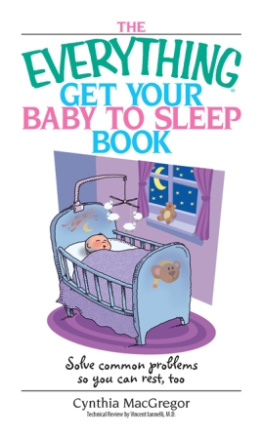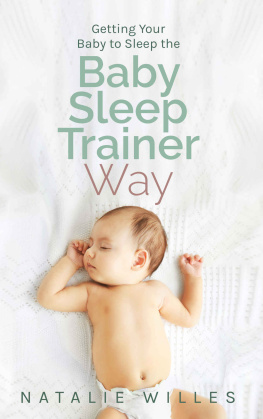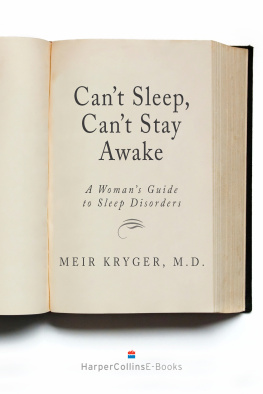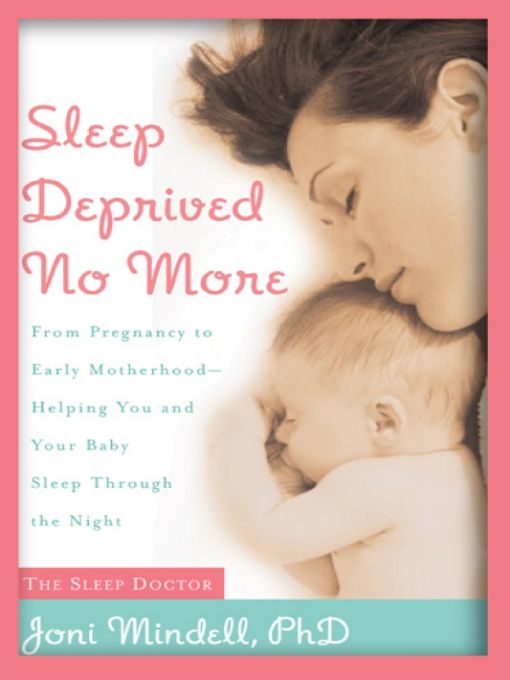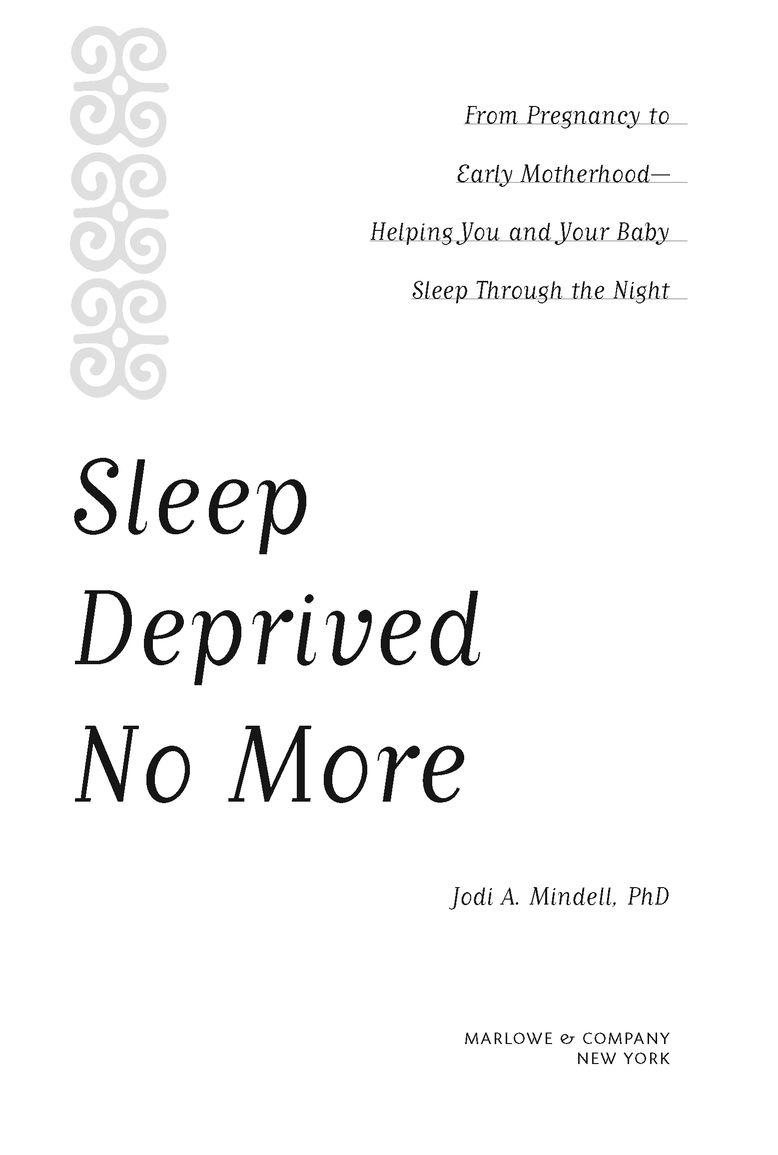Table of Contents
JODI A. MINDELL, PHD, is the author of Take Charge of Your Childs Sleep: The All-in-One Resource for Solving Sleep Problems in Kids and Teens and Sleeping Through the Night: How Infants, Toddlers, and Their Parents Can Get a Good Nights Sleep. She is the associate director of the Sleep Center at the Childrens Hospital of Philadelphia and professor of psychology at Saint Josephs University.
To Scott and Caelie, as always
Acknowledgments
My deepest appreciation goes to those who continue to support my endeavors to educate the world about sleep: my agent, Carol Mann, and my editor, Katie McHugh, for believing in this project; Mark Turner, my all-time champion; Emily Miles Terry, Leslie Rossman, and Linda Phelan of Open Book Publicity; all of the hardworking folks at Johnsons Baby who support my dream to get the word out about sleep, including Lorena Telofski, Kate Luedtke, Ben Wiegand, Ellen Kurtz, Brian Gartside and my colleagues in the Department of Psychology at Saint Josephs University and in the Sleep Center at the Childrens Hospital of Philadelphia, as well as all of my colleagues in the world of pediatric sleep, including Judy Owens, Lisa Meltzer, Avi Sadeh, and Mary Carskadon.
Huge thanks go to all of my friends and relatives who have been there throughout the years, especially my parents, who continue to provide all their support and encouragement. But my biggest thank-you continues to go to my two favorite people in the whole world: my husband and biggest supporter, Scott McRobert, since none of what I do would be possible without him; and my daughter, Caelie, who continues to be the center of our universe and who luckily doesnt mind that her mom travels all the time and who loves her daddy-daughter days.
PART I
An Introduction to Sleep
ONE
Sleep Deprived No More
To sleep, perchance to dreamay, theres the rub.
Shakespeare, from Hamlet
Ahhh, to sleep! Doesnt that sound glorious? There is nothing better than crawling into bed after a long day and falling into a deep sleep, not waking until the next morning. Unfortunately, blissful sleep may be just a fond memory. Now that you are pregnant or a new mom, sleep may not be as simple or as easy as it used to be.
Most pregnant women struggle with sleep problems. And these problems dont just start in the third trimester. Rather, thanks to surging hormones, sleep disturbances may begin right at the start of pregnancy. That means that you may experience nine long months of problems sleeping. And unfortunately, obstetricians and other health care providers often ignore sleep problems. Pregnant women are frequently told that it is just part of pregnancy and they must deal with it. Usually the most sympathy they receive is a comment from friends and family: Just wait until you have the baby, then youll know what lack of sleep means.
Once the baby arrives, expect less sleep, at least for the first few months. Your baby is going to be up during the night, especially in the first month or two, and yes, there are sure to be some tough days. After that, your babys sleep schedule will start to become more predictable and everyone in the house will start getting more sleep. However, heading back to work, taking care of other children, and lifes ups and downs can all contribute to continued sleep issues.
Luckily, however, even during pregnancy and post-baby, sleep is possible. You dont have to suffer through countless sleepless nights and spend your waking moments feeling totally sleep deprived. This book will show you many things that you can do to get the sleep you need so that you can fully experience the wondrous moments of pregnancy and your brand-new baby.
Common Sleep Issues Faced by Pregnant Women and New Moms
SLEEP ISSUES ARE almost universal! Look left. Look right. If you see a pregnant woman or a new mom, chances are that shes experiencing some type of sleep struggle, whether just waking up for a quick trip to the bathroom or experiencing prolonged sleepless nights. The National Sleep Foundations Sleep in America Poll 2007 surveyed women of all ages and found that pregnant women and new moms were especially likely to experience sleep problems.
| Pregnant Women | New Moms |
|---|
| Report that they rarely or never get a good nights sleep | 30% | 42% |
| Experience insomnia at least a few nights a week | 84% | 84% |
| Snore | 27% | 29% |
| Have restless legs syndrome | 21% | 8% |
| Nap at least twice a week | 54% | 40% |
| Have driven drowsy at least once a month | 31% | 38% |
Pregnancy
In addition to the above findings by the National Sleep Foundation, a study that we conducted in my lab on sleep during pregnancy found that 97 percent of pregnant women fail to sleep through the night by the end of their pregnancy and 92 percent sleep restlessly. So just about every pregnant woman faces some kind of sleep issue. Just because sleep problems are typical during pregnancy, however, doesnt mean that you cant do anything about them. Your sleep may never be perfect while you are pregnant, but there are many things that you can do to improve it as much as possible. That is what this book is about: helping you sleep better so that you can feel your best.
New Moms
Similarly, new moms are not getting the sleep they need. A majority of new moms do not get enough sleep at night, and most say they dont get a good nights sleep most nights. Some of these sleep issues are related to being up with the baby during the night, but another portion are due to poor sleep habits and other common sleep disrupters. Again, this book is here to help.
How Much Sleep Do You Need?
THE AVERAGE ADULT needs 8 hours of sleep. Actually, studies indicate that it is really 8.2 hours (8 hours and 14 minutes). This number comes from classic studies in which adult volunteers stayed in caves for weeks at a time. All of the adults ended up getting 8.2 hours of sleep every night. There are some individual differences, so we typically recommend that adults need between 7 and 9 hours of sleep at night. Thats right, there are just as many people who need less than 8 hours of sleep at night as there are who need more than 8 hours.
Interestingly, recent research seems to show that there really arent that many individual differences in sleep need. Rather, it indicates that there are individual differences in how well people tolerate being sleep deprived. That is, everyone needs about 8 hours of sleep, but some women have an easier time getting by on 5 or 6 hours than others. Unfortunately, there is no way to train your body to handle being sleep deprived. You can either tolerate it or not. Figuring out whether you are one of these people, though, will help you determine the minimum number of hours of sleep that you need (see quiz, pages 8-9).
How Much Sleep Are Pregnant and New Moms Actually Getting?
ONE QUESTION THAT often is asked is how much sleep women really get when they are pregnant and after the baby is born. One study surveyed women before they were pregnant, during their pregnancy, and then in the three months after their delivery. Below are some of the results of this study.


